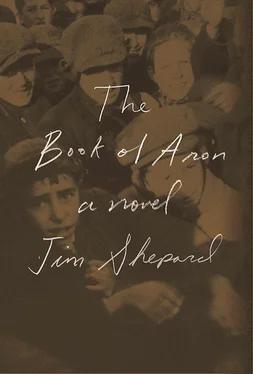Other gangs heard about it and started using it. When we tried to stop them they beat us. When we came back with metal pipes they outnumbered us and were bigger besides. Once they’d taken it over they made such a racket going through that one kid got caught by the Jewish police and was turned over to a German who shot him in the face. We saw him later, still in the street, with his cheek open and his back on a sewer grate. I didn’t want to look but Lutek stood over him with his hands on his hips like killing him had been his idea. Our hole had been sealed up with cement, and Lutek told me, “Three weeks, every night I worked on that.”
First we were discouraged and then he said we’d been doing it the hard way and that one of his father’s friends was now in the Jewish police and working the gate at Leszno Street. We watched him for a day or two. All three police forces had their sentry posts, German and Polish on one side and Jewish on the other. We called the Jews the yellow police because of their armbands and the Poles and Germans the blue and green police because of their uniforms. Lutek said the Jews were watched by the yellow police and the yellow police by the blue police and the blue police by the green police and the green police by the Gestapo. And where was the Gestapo? I wanted to know, and he said “Aha!” as though I’d said something very smart. Everyone was always calling on everyone else to come over and translate for soldiers or work details passing through the gates, and during one shift the green and blue police had set up a business with Lutek’s father’s friend. “So it’s just a matter of everyone getting their taste,” Lutek said. Yellow took five, blue took ten, and green took twenty złotys per parcel. A good time to go through was when the guards had to search a lot of autos that were backed up. We just had to stand where we could see everything and then learn to wait, wait, wait. When it was safe to deal the friend would gesture for the blue policeman to come inside the gate and off we could go.
Lutek’s father also told him about a new system for dealing with the blackmailers: once they surrounded us on the other side of the wall we called over the blue police and told them we were being robbed and that we wanted everyone taken to the station to sort things out. That was the code for the blue police to arrest us, and the blackmailers ran away. At the station we gave the blue police their cut and they let us go when the coast was clear.
We were waiting to go through a week later when Zofia and another girl with dark curly hair walked by with two baskets of goods. They set their baskets down, chatting and laughing, and the other girl shook out her hair like she’d just taken off a hat, and they pulled off their armbands and hoisted their loads again and walked right past all three sentry posts and out of the ghetto. The green policeman even said some kind of hello as they went by. Zofia waved and said something in response that he seemed to like.
The next day we visited her apartment to ask if she and her friend wanted to join our group. “What group?” Zofia asked, and seemed unimpressed when I told her what we had going.
The new girl’s name was Adina. She was from Baranowicze and you could tell she was from the east from her singsong way of speaking. She said she was a year older than us. She was pale and thin with sad black eyes. She didn’t like to talk and always got angry when asked a question. She said that one day she’d come home late from dropping off some sewing and the Germans had driven her cousins out of town in a truck and forced them to jump into an open fire. Those who wouldn’t jump were shot. A cousin who escaped into the woods had told her about it. Then her whole family had been herded west with other families through three villages and those who couldn’t keep up were shot at like ducks until finally they were all loaded onto some trucks and driven into Warsaw. She said she’d brought her best clothes but that her mother had managed to bring only her ceramic stew pot loaded with three bottles of cooking oil.
Lutek kept asking her about the fire part of her story until Zofia finally told him that if he didn’t stop she’d throw him into a fire herself.
So I asked about the oil instead. “What are you looking at?” Adina said to me, and made a face. “He’s in love,” Lutek told her. “He worries me,” she told him back. “Why would your mother save oil?” I asked her again.
She said her parents used to have a shop that sold oil her father had produced himself and was very proud of. He died before the war and the shop had gone downhill even before the Germans came. Her mother was bitter about it still and whenever anyone asked for credit or a favor, she always said, “Sure, it’s nice to screw on somebody else’s sheets.” Lutek said that that could be our group motto and Zofia said again what made him think there was going to be a group.
“We might as well do something,” Adina told her. Back home she said that there’d always been something she needed to be doing but that here she went out into the street and then in no time at all she’d go back to their apartment again, since what was there for her to do in the street?
Lutek asked what made them think they could just walk through the gates and Adina told him she’d always had a talent for that sort of thing. When they got to the city and passed through the center for refugees she told her mother that she’d hide their money and made sure she went first when her family had lined up to be searched, and a Volksdeutsche woman felt around in Adina’s hair for a long time, as though she kept her treasures there, then found a bundle in the pocket of her skirt and pulled it free and exclaimed, “And what are these? Diamonds?” and spilled them out onto a table only to discover they were hard candies. The other Volksdeutsche laughed and the woman slapped Adina’s face and threw her out of the room without finding the gold coins she was also carrying.
WE ALL WORKED TOGETHER FOR A WEEK AND THEN an old Polish woman grabbed Adina and shouted “Smuggler! Smuggler!” when they were coming back through the gate, so Lutek grabbed the old woman and started shouting the same thing and his father’s friend had to drag all three over to the green and blue police to work the whole thing out. Zofia and I went a block away before stopping to watch. The rule with us was always if one got stopped the others walked on. The old woman made a racket we could hear from there. Zofia said Lutek had dropped whatever he’d been carrying into her bag.
“This is going to take a while,” she said and I told her she was probably right. Neither of us had anywhere to go. She worried that Adina would be beaten even if they set her free and said she should’ve gone in her place. When she’d been caught, because of her looks the blue policeman had beaten her but not as a Jew.
“What makes old people like that?” she wondered. I told her I didn’t know.
She said that a few days after the city surrendered, someone had told her mother that her father’s father, her other grandfather, wanted to see her. Zofia had never met him. He was a rabbinical scholar, she never knew what sort.
I waited for her to go on. I was happy that we were talking like this.
She said her parents told her that this grandfather had a lot of money, she didn’t know why, and that her mother was excited because maybe this would allow them all to emigrate. Zofia had never met him because when her father married someone non-Orthodox, his father told him that as far as he was concerned, his son had died, he’d already buried him and mourned his passing.
“So what was he like?” I asked.
“The one thing my father told me was that he wrote letters to God,” she said. “That seemed like an interesting idea. I wondered what he did with them.”
Читать дальше












